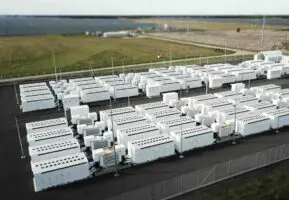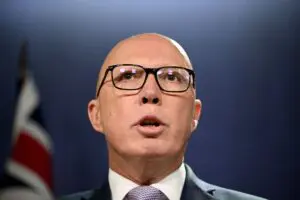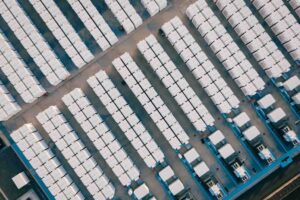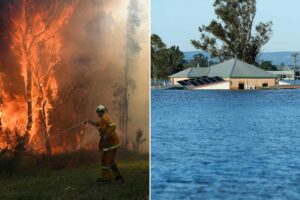As the Coalition government’s energy and environment ministers and their Labor counterparts sit down to resume discussions over the renewable energy target, one question that should overhang the negotiations is this: “What would Malcolm do?”
Tony Abbott’s position is clear: He established a panel of climate deniers and fossil fuel supporters to argue that the RET should be removed completely or slashed by more than half. The latter remains its negotiating position.
But talk of a leadership spill offers the real possibility that Malcolm Turnbull could be the new prime minister as early as next week. As veteran Canberra political writer Michelle Grattan writes, Abbott will either go now, or soon. His leadership is terminal.
What we can assume is that when this happens Turnbull would sweep away the cabal of climate deniers that have installed themselves in and around the PM’s office and dominated the government’s policy making.
This would include Abbott’s main business advisor, Maurice Newman, who was at it again on Friday, writing in The Australian that 2014 was NOT the hottest year on record, and that NASA, NOAA, the World Meteorological Organisation, the Australian Bureau of Meteorology, Japan’s Meteorological Agency, and the UK Met Office were all wrong for thinking so. Why? Because he had read as much on an obscure though notorious climate denier website favoured by the Mad Right.
So, one suspects we can count on Turnbull to sweep a broom through the likes of Newman, Dick Warburton, Tony Shepherd and David Murray – all climate deniers in charge of advising the government on key policy areas.
What Turnbull won’t do is reverse Abbott’s dumping of the carbon price. The Guardian’s Lenore Taylor gives a good explanation of why here. While Turnbull has been a fierce critic of Direct Action, he also believes it can be adapted into a baseline and credit scheme of the type he has long favoured. In effect, it will be a trading scheme without the word tax.
The mechanism to do so is already built into Direct Action with the so-called “Safeguards” – which means that companies are capped on the amount of emissions they can produce.
This “baseline” can be tightened as needed – particularly if Australia needs to meet a more ambitious target in light of the Paris climate talks – and companies that meet their target could sell their “surplus” to other companies that struggle.
Turnbull could also open up the international market to allow corporates to buy offsets (not a bad idea at the moment considering how cheap they are). And we can be sure that Turnbull would bring a more constructive Australian approach to those climate talks in the lead-up to Paris.
According to The Australian, the Nationals say supporting Turnbull would be conditional on him not bringing back the carbon price, and avoiding other things that might threaten rural life as the Nationals see it, such as gay marriage and relaxed immigration laws.
 Renewables is a different matter. Turnbull is known to be a supporter – as are most Nationals. Turnbull understands that the world is on the cusp of an energy revolution, and that new technologies will not send the economy back to the dark ages. Judging by his response to his Tesla test drive – he thinks it could be rather fun, and exciting.
Renewables is a different matter. Turnbull is known to be a supporter – as are most Nationals. Turnbull understands that the world is on the cusp of an energy revolution, and that new technologies will not send the economy back to the dark ages. Judging by his response to his Tesla test drive – he thinks it could be rather fun, and exciting.
And he knows that such a transition is essential for investment, jobs and the competitiveness of the economy. And he knows that the only reason for not going ahead with the renewables target is to protect the interests of the coal lobby.
Supporting a robust renewable energy target, either unchanged from its current level of 41,000GWh, or with minor changes, or delays, as recommended by the Climate Change Authority, would help Turnbull recapture the centre of the policy debate.
What is interesting to note is the response of Labor, who seem petrified by the prospect of Turnbull returning, and stomping over their middle ground. When in power, Labor lost sight of its policy development, and stopped selling its climate package, just so it could try to wedge Turnbull, the then Opposition leader. That worked out badly, for everyone except Tony Abbott and the climate deniers who put him in power.
Now, Labor has tried to wedge Turnbull again, even before he puts up his hand for Liberal Party leadership. This week, environment spokesman Mark Butler issued a press release labeling Turnbull a “fraud” on climate change, including a “best of” list of quotes highlighting Turnbull’s vocal gymnastics as he tried to marry his obvious disdain for Direct Action with his need to follow the party line.
“He might wear a nicer suit, but Malcolm Turnbull is as backwards as Tony Abbott when it comes to action on climate change,” Butler noted.
“This is despite Malcolm Turnbull declaring: ‘I will not lead a party that is not as committed to effective action on climate change as I am’.”
Yes, but getting agreement on the RET – and starting to tap into the $20 billion of investment that is in danger of disappearing overseas would be a good place to start. Labor had the opportunity to lock this issue away in 2012, but refused to take up the CCA’s recommendation that the next review be put off to 2016.
As ACT energy minister Simon Corbell said, after announcing successful tender for 200MW of wind energy:
“No progress suits their policy agenda, which is effectively to put in the deep freeze the development of large-scale renewables across Australia.
“I can only trust that with the tide turning against the Abbott government, that there will be a rethinking about the impact that their policy position has had on jobs, and on economic development in the renewables sector right around the country, including in many regional areas.”
Roger Price, one of the winning tenderers of the wind auction, put it this way:
“Over the last four years despite significant local investment, we have generated very little revenue in Australia, thanks to Federal Government inaction and deliberate nobbling of the renewable energy industry.
“Our business has only survived due our ability to successfully generate export revenue. I find it frustrating to keep hearing phrases from the Federal Government like “supporting small business” and “creating sunrise industries” when their actions are clearly inconsistent. If they are genuine they need to support a substantial and ambitious renewable energy target.”









